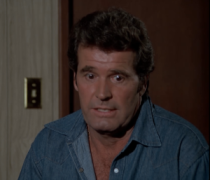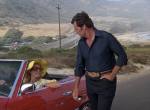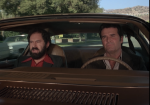Though it may be hard to believe, Apr. 7, 2013 marked the 85th birthday of one of TV’s most timeless icons, James Garner. Thanks to the magic of syndicated reruns, Garner is instantly recognizable to generations of TV viewers as Jim Rockford, private investigator and beach parking lot trailer inhabitant.
If you’re like me, the phrase, “two hundred dollars a day plus expenses” served as a childhood credo, the magic over/under number that seemed like some sort of gateway into adulthood. Whatever your chosen profession, if the quote on your business card–or answering machine message–was $200 a day plus expenses, you’d be writing your own ticket and living in a beachfront condo. In 1974, two hundred dollars a day was a princely sum, more than the average major league baseball player earned in fact. But it was the “plus expenses” part that hinted at the great unknown.
 Of course with Jim Rockford, the carpet didn’t match the drapes. There was no beachfront condo, there was a beachfront trailer badly in need of a coat of primer. Rockford’s answering machine and outgoing phone message may have seemed like 1974’s version of “Lifestyles of the Rich and Famous,” but the incoming messages were from bill collectors with overdue dry-cleaning notices.
Of course with Jim Rockford, the carpet didn’t match the drapes. There was no beachfront condo, there was a beachfront trailer badly in need of a coat of primer. Rockford’s answering machine and outgoing phone message may have seemed like 1974’s version of “Lifestyles of the Rich and Famous,” but the incoming messages were from bill collectors with overdue dry-cleaning notices.
Rockford had a ¼ page ad in the Yellow Pages, but he also had an unfinished game of solitaire on his desk.
Rockford’s people weren’t Bob & Carol & Ted & Alice, they were Beth & Rocky &, Dennis & Angel. (Rockford taught another another truism: Anybody named Angel is born to be trouble, male or female.)
Jim Rockford was an everyman, a tall, handsome everyman whose profile was worthy of Mount Rushmore, but an everyman nonetheless, just a guy in a trailer trying to keep the power from getting shut off.
There were plenty of other TV dicks with hour-long primetime slots in those days, but Rockford was the most photogenic of them all. Malden, Ebsen, Cannon, Baretta–not a particularly good-looking bunch of lead detectives by any stretch. But Rockford’s handsomeness was countered by his outsider status. Jim Rockford did time, and although we’re told that it was for a crime he didn’t commit, in the eyes of the law Rockford will always be an ex-con, an eternal pariah to the American judicial establishment.
Rockford was too busy being a fugitive from injustice to ever become a legitimate sex symbol. In the Seventies, you needed a moustache for that. Unlike Burt Reynolds and Tom Selleck, there were no James Garner wall posters adorning bachelorette bedrooms. Rockford’s Pontiac Firebird was probably the biggest sex symbol on the show.
***
Whether in movies or television, never underestimate the strength of a soundtrack. We do as much watching with our ears as with our eyes. While the Rockford Files’ visuals are compelling enough, the show also offers great ear candy. This ear candy is the secret ingredient that makes the Rockford Files so much more watchable than other similar shows. It is rerun comfort food, and the soundtrack is the subliminal reason why it tastes so good.
The theme song is famous in its own right. Other than Garner himself (and possibly Stuart Margolin as Angel), this tune is the single most memorable thing about the show. It was the first TV theme song to achieve Top-40 radio success in the 70s, peaking at No. 10 on the Billboard Hot 100 and going on to win a Grammy for Best Instrumental Arrangement of 1975. This is the song that put Mike Post and Pete Carpenter on the map.
Other TV theme songs quickly followed on the heels of The Rockford Files in becoming Top 40 radio hits–Happy Days, Welcome Back Kotter, and later The Dukes of Hazzard and Greatest American Hero–but these were all ballads with lyrics. The Rockford Files theme was pure instrumentation: Soundtrack music accompanied by a montage of photo stills illustrating the life and times of James Rockford.
It’s easy to forget that this was an era before MTV and VH-1. Show intros like Rockford’s fulfilled the same role that music videos would in the 80s. In the Seventies, show intros were our MTV.
Go ahead and watch a Rockford Files rerun. You’ll realize that the musical mood established with the opening theme carries through for the entire episode. Country/bluegrass jams are used throughout as sound beds for car chases, describing a character’s emotional arc, to evoke a sudden mood change, punctuate a hard cut, twist the plot, or simply to brighten up the scenery.
The Rockford Files reminds us how good L.A. could look with a country twang, even in the disco era. By the 70s, L.A. had become a prisoner of its own gridlock, smog, and overdevelopment, but Rockford liberated the landscape simply by using music that evoked the freedom and wide-open spaces of the Old West. Revisit an episode with open ears and see if you don’t find that it is the best use of harmonica ever.
* * *
Of course, no visual pairs better with a country-bluegrass sound bed than a good car chase scene, and car chases are a staple of every Rockford Files episode. The Arthur Penn-directed “Bonnie & Clyde” (1967), was a groundbreaking film in many ways, one of which was the marriage of car chases with banjo and fiddle music, which had an invigorating effect on audiences. Following Bonnie & Clyde, the period from 1968-74 was the golden age of car chase movies, when the classics of the genre came out, starting with “Bullitt” (1968), followed by “The Vanishing Point,” “The French Connection,” and “Gone in 60 Seconds.” This six-year span also included “The Seven-Ups,” “Two Lane Blacktop,” “Duel,” and “The Italian Job.”
But as far as I know, no one was doing it on television until Rockford came on the scene. Country-fried car chases were a new phenomenon on TV in 1974, like answering machines were. Of course, “Starsky & Hutch” and “Dukes of Hazzard” would follow, but Rockford was doing it first. And what’s notable about those other car-chase shows is that it took two-men to do what Rockford did on his own.
There were not too many muscle cars on the tube in 1974 either. Most of the TV dicks of the time–Cannon, Barnaby Jones, Karl Malden–drove land yachts. The above-mentioned Starsky & Hutch did indeed drive a Seventies-looking sports car, and, what a surprise, their show debuted at the end of The Rockford Files’ first, and highly Nielsen-rated, season.
***
While revisiting “Bonnie & Clyde” for car-chase information, I stumbled onto an epiphany: In addition to being a groundbreaking film, Bonnie & Clyde represented everything that was wrong with the 1968 generation. The film rewrote history to portray a couple of violent thrill-killers as a misunderstood Romeo & Juliet hopelessly pitted against an omnimalevolent Establishment. It glorified Bonnie & Clyde as martyrs and reveled cartoonishly in the blood they spilled. It inspired hundreds of thousands of gullible youths to take the message literally and to act out in ridiculous self-serving ways, in essence to loot the noble ideals that had been so painstakingly built up during the earlier part of the 60s and pawn them on an orgy of sex, drugs, violence, and rock and roll, no doubt setting back the legitimate aspirations of that decade by at least half a generation.
And what about that generation that followed the Sixties? I had another epiphany: Jim Rockford is the Bonnie & Clyde of the post-Woodstock generation. Rockford Files was the go-to afternoon re-run for latchkey kids of the 70s and 80s. It’s a big part of what makes us the people we are today. We don’t self-identify with an extroverted glamour couple shooting up banks and pissing off old folks just for kicks. Our patron saint is a guy who lives in a trailer by the beach and appreciates the little things in life: the smell of the sea, the sound of the gulls, and an onion ring basket shared with a good friend over a picnic table. This was the same strain of disillusioned anti-materialism that ushered in the 90s in response to the steroidal greed of the 1980s. That’s why Ben Folds writes lyrics about getting stoned and watching Rockford Files reruns instead of Barnaby Jones or Magnum, PI.
Unlike Bonnie & Clyde, who decided to combat the boredom of their lives by robbing banks and killing for kicks, Rockford was set up; he was wrongfully convicted of a crime he did not commit. Nearly every episode sees him going up against a hostile police force that continues to hold his false conviction against him in perpetuity. If anyone had a right to be angry at society in general and authority in particular, it’s Jim Rockford. But do you see Rockford acting out like Bonnie & Clyde? Not even close. He doesn’t even like guns.
Inadvertently, James Rockford is the folk hero of post-Watergate era America. Respect for the establishment is at an all-time low, but people are also burned out on the Bonnie & Clyde-style excesses of the Sixties. Each week, Rockford treads the fine line between powerfully corrupt authority figures (ie The Man) and shallowly groveling opportunists (eg Angel Martin), and he does so without ever having to fire a shot (almost). He was the ideal outlaw figure for the times.
Perhaps it was the leaded gasoline fumes that made us all more lethargic, but to the best of my recollection, the mood in America just after Watergate was decidedly hung over, and no one pulls off a ‘where the hell’s the damned aspirin’ look like Jim Rockford does at least twice an episode.
The trailer’s leaking, the Pontiac just blew a retread, Angel’s shaking him down for another sawbuck, and the insurance company isn’t going to pay out after all. That was exactly how the Seventies felt; but Rockford persevered with style, ending every episode with a wry twist that let us know that no matter how much it felt like things were spiraling out of control, at the end of the day we always break about even.
***
What is sometimes overlooked is that “The Rockford Files” was actually James Garner’s second great act in television. Garner is one of the select TV actors who starred in his own series not once but twice, and in two very different timeframes. In the era when television was black and white, Westerns reigned supreme, and Eisenhower was still President, Garner was Bret Maverick. In the era of dystopian, post-Watergate detective shows, he came back as Jim Rockford.
During that interregnum between 1959 and 1974, America had changed about as radically a society could in 15 years, Not too many actors could bridge that gap and stay relevant, but Garner did just that. It was a totally different America in 1974, but Garner was still Garner and Maverick was now Rockford. The people who ran television liked Garner so much they paid him the ultimate network tribute, allowing him to use his real first name for the character of Rockford.
Garner was still a smooth-skinned post-adolescent when he played Bret Maverick. As Rockford, his majestic profile had matured into its fully chiseled peak. When the time came, Garner walked away from both shows on his own terms, leaving money on the table each time, enhancing his outlaw status.
Rockford portrayed an ageless quality on-screen, so it might surprise people to know that James Garner was 46 years old when the show embarked on its five-year run. And unlike other leading men, Garner did almost all his own stunt-work and live car chases, as well as appearing in almost every scene of every episode. He put his middle-aged body through the ringer to play that part, and the toll it took may have been the primary reason he decided to pull the plug on the program during its sixth season.
***
“I knew those two weren’t Feds. Feds still wear narrow ties.” Rockford fingering a couple of imposters in an early episode of the first season.
Yes we are boldly in 1974 with this program. There is no ironic Seventies appreciation here, only the real thing. When “The Rockford Files” came out, it was cutting edge, not nostalgic. That’s why it gives us such great insight into what was actually considered cool in the mid-70s: wide ties, earth-tone Pontiacs, and witty answering machine banter.

Kids, that’s a payphone; notice the rotary dial. Payphones were a major part of Rockford’s business model.
One other thing about 1974. It’s closer in time to the 1930s than the 2010s. With fresh 2013 eyes, what you notice is just how much a Rockford Files script mirrors one from the classic LA Hardboiled detective genre of the 1930s and 40s (think “Double Indemnity” 1944). It’s all there: The snappy banter; the archetypal characters–hoods, goons, dicks, Seamuses, high-class dames and femme fatales; and air that bristles with sexual electricity but always maintains a puritanical approach to what is actually portrayed on-screen (which happens to be much less than a Close-Up toothpaste commercial of the same era).
Detectives have been part of L.A.’s fictional landscape since L.A. began producing fiction. In novels, movies, or T.V. serials, the City of Angels has always had detectives as protagonists. But there was only one that ever lived in a trailer in a beach parking lot. As I touched upon in a different blog post, Jim Rockford represented the fusion of one Southern California archetype, the hardboiled detective, with another SoCal archetype, the off-the-grid beachcomber. It’s uncertain when we will see another like him come this way again, but Rockford’s place at the top rung of syndicated reruns is eternal.














25 comments for “In Praise of Rockford”